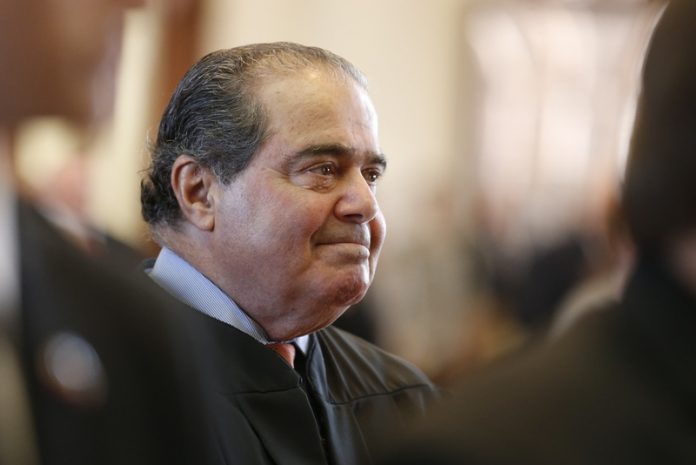Editor’s note: This story is updated throughout.
U.S. Supreme Court Associate Justice Antonin Scalia, 79, was found dead of apparent natural causes Saturday morning at the Cibolo Creek resort near Marfa, Presidio County officials confirmed.
Presidio County Judge Cinderella Guevera pronounced Scalia dead after 1 p.m., Justice of the Peace David Beebe told The Texas Tribune.
Scalia, appointed to the court by President Ronald Reagan in 1986, was found in his room at the Cibolo Creek Ranch after he did not appear for breakfast, the San Antonio Express-News reported.
The longest-serving justice on the court, Scalia was known for his conservative judicial philosophy. His death will have a major impact on the nation’s highest court, which now has four justices appointed by Democratic presidents and four appointed by Republicans.
Because of the contentious nature of the cases heard by the Supreme Court, the nomination of prospective justices is highly politicized. Nominees go through a two-step process to earn their spot on the court: They must be appointed by the president and then confirmed by the U.S. Senate, whose majority is currently held by the GOP.
The prospects for an Obama appointee being confirmed before his term ends in January are slim to none, according to Sanford Levinson, a constitutional law expert at the University of Texas at Austin.
“Obama might nominate somebody, but the odds of that vacancy being filled before next year approach zero,” Levinson said. “The Republican Party won’t accept anybody who would be nominated by Obama.”
“They’re going to have to get used to being an eight-person court for at least the next year,” he added.
Obama successfully appointed two current justices, Elena Kagan and Sonia Sotomayor, during his first term in office, when the Senate had a Democratic majority.
Until the vacancy on the court is filled, the Supreme Court will continue to hear cases as an eight-member body. Cases that result in 4-4 votes automatically revert to the ruling of the lower court that had most recently heard them. The justices may choose to “push over” cases that they have already accepted until after a ninth member can be confirmed.
The justices had already heard two controversial Texas-centered cases this term: Fisher v. The University of Texas at Austin, regarding the college’s affirmative action policies, and Evenwel v. Abbott, about the “one person, one vote” principle by which state legislative districts are determined. The Supreme Court has not issued a ruling on either case.
The Supreme Court accepted two additional Texas cases — one focused on immigration, the other on abortion — but had not yet heard oral arguments in either one.
In Texas v. United States, lawyers for the state are challenging a controversial executive order, known as Deferred Action for Parents of Americans and Lawful Permanent Residents, which would shield more than 4 million undocumented immigrants from deportation proceedings.
In the abortion case, Whole Woman’s Health v. Hellerstedt, abortion providers are challenging House Bill 2, the state’s 2013 abortion law. If the Supreme Court rules that HB2 is constitutional, it could result in the shuttering of about half the state’s 19 remaining abortion clinics.
It didn’t take long after Scalia’s death for politics to come into view. Within an hour of the first news reports, U.S. Sen. Ted Cruz, R-Texas, a leading Republican candidate for president, tweeted that he believed the justice should not be replaced until President Obama is out of office.
“Justice Scalia was an American hero,” Cruz tweeted. “We owe it to him, & the Nation, for the Senate to ensure that the next President names his replacement.”
Scalia was the second-oldest justice behind Justice Ruth Bader Ginsburg, who is 82. Ginsburg’s age and her health have been the frequent focus of Democrats, who had urged her to retire while Obama is still in office.
Disclosure: The University of Texas at Austin is a corporate sponsor of The Texas Tribune. A complete list of Tribune donors and sponsors can be viewed here.
This article originally appeared in The Texas Tribune at http://www.texastribune.org/2016/02/13/us-supreme-court-justice-antonin-scalia-found-dead/.



















